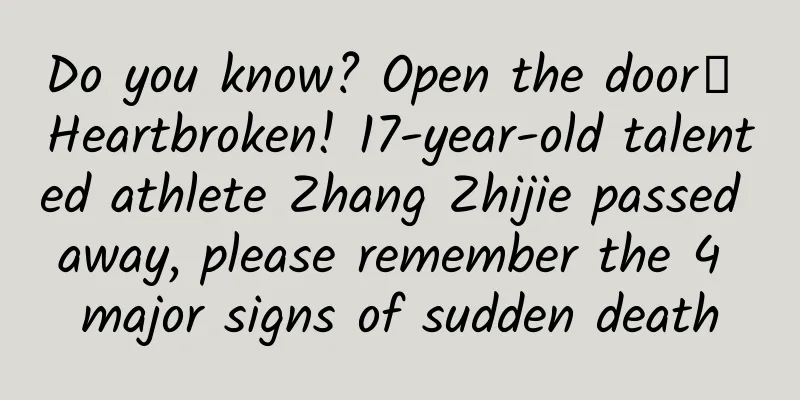"Hernia" should be "hernia" at the end. Let's talk about the "hernia" that you care about

|
Author: Xu Haozhong Shenzhen Children's Hospital Reviewer: Xiao Dong, Chief Physician, Shenzhen Children's Hospital "Hernia" is a common clinical disease with various types, and inguinal oblique hernia is one of the most common hernias in children. Some parents often find a lump near their child's scrotum. As long as the child cries or moves for a long time, the lump will appear, and when the child lies down or sleeps, the lump disappears. This is basically an inguinal oblique hernia. Let's talk about this hernia. 1. Why does inguinal hernia occur? Every child, whether a boy or a girl, will have a bulge in the abdominal cavity to the inguinal area and form a tube when they develop to a certain stage during the fetal period. We call this bulge the "processus vaginalis". For boys, the processus vaginalis is the channel for the testicles to descend to the scrotum; for girls, the processus vaginalis is the channel for the round ligament of the uterus. Normally, this channel will close after the testicles or the round ligament of the uterus reach the corresponding position. Just like when we sow seeds, we first dig a hole, then sow the seeds, and finally cover the soil back. If we don't cover it, something will fall into the hole. Once this channel, the processus vaginalis, is not closed, the organs in the abdominal cavity fall into the processus vaginalis, and an inguinal oblique hernia is formed. The most common organ that falls into the processus vaginalis is the intestine. The "gas" in the "hernia" we are talking about is actually the gas in the herniated intestine. In addition, girls may also develop a hernia because one ovary falls into the processus vaginalis. Figure 1 Copyright image, no permission to reprint 2. Are there any dangers of inguinal hernia? Generally speaking, inguinal oblique hernia can return to the abdominal cavity by itself when the child lies quietly and flat. This situation has little impact on the child in the short term. However, if the inguinal oblique hernia protrudes repeatedly for a long time, it will affect the child's digestive function, and the child may experience constipation, loss of appetite, abdominal pain, etc. In clinical practice, many children with inguinal oblique hernia are always constipated before surgery, but the constipation problem is often solved after the surgery. However, if you encounter special circumstances, you should be especially careful. This special situation is incarcerated inguinal oblique hernia, which is very serious and even life-threatening. According to data, the probability of incarcerated inguinal oblique hernia is more than 20%. So, what is incarcerated inguinal oblique hernia? Simply put, the intra-abdominal organs (such as intestines or ovaries) that fall into the processus vaginalis are stuck, and they cannot return to the abdominal cavity by themselves even when the child lies quietly. Just like a naughty kitten likes to drill holes, but some holes are easy to drill into, but difficult to retract, and then the kitten will get stuck there. The place where the kitten is stuck is mostly the neck, which will affect its breathing and eating. Over time, the kitten will die. The same is true for the intestinal tube that falls into the processus vaginalis. Once it is stuck and the compression time is too long, the intestinal tube will be necrotic or even perforated, which will cause sepsis, which will endanger life. In addition, incarcerated inguinal hernia will also affect the next generation of children. For girls, if one ovary is incarcerated, once necrosis occurs, it is equivalent to losing one ovary. If the other ovary is not functioning well, it will affect the girl's future fertility. This is easy to understand, but what about boys? Let's talk about the results first. Incarcerated inguinal hernia can cause testicular necrosis. This is because although the testicles are in the scrotum, their nutrient supply line - the blood vessels extend upward through the inguinal area, and the incarcerated intestines and other internal organs often flatten this blood vessel, causing the nutrient supply line of the testicles to be cut off. Without nutrient supply, the testicles will naturally necrotize. In summary, inguinal oblique hernia incarceration may cause serious consequences. Once discovered, you must seek medical attention as soon as possible. The intestines, testicles, ovaries or nutrient supply blood vessels can generally only support 8 to 12 hours after being stuck. If it exceeds this time, the possibility of necrosis of the incarcerated material will greatly increase. 3. What should I do if I find out that my child has an inguinal hernia? If parents find that their children have inguinal oblique hernia, they must "end" it to prevent future troubles. At present, there is no medicine to treat inguinal oblique hernia in children. The most effective and accurate method is surgery. It is like a hole in a piece of clothing. No washing powder or liquid can wash the hole. Only repair can solve it. Figure 2 Copyright image, no permission to reprint What is inguinal hernia surgery like? The surgery for treating inguinal oblique hernia can be summed up in two words - repair. For children, because their bodies will continue to grow and develop, doctors generally do not choose to "patch", that is, use a patch to repair, but use the simplest hernia sac ligation. If the hernia sac is regarded as a sack, we just need to tie and seal the mouth of the sack, so that nothing will fall into it, and the inguinal oblique hernia will be cured. With the development of medical technology, hernia sac ligation can now be completed completely in a minimally invasive form. One operation can also deal with problems on both sides at the same time. Not only is the wound hidden, but the recovery after surgery is fast. Basically, the patient can be discharged from the hospital the next day after surgery, and it will not affect diet and normal life. Figure 3 Copyright image, no permission to reprint 5. Are there any risks in the surgery? The risk of hernial sac ligation is very low, and it is performed under general anesthesia. The child does not feel any pain during the operation, and does not know the process of the operation, so this operation will not cause psychological fear in the child. As long as the child does not have other diseases, they can basically survive the operation and recover quickly. However, if the child has symptoms such as coughing and fever, the operation cannot be performed until they recover. 6. When is the best time to have surgery? 8 to 12 months of age is the best time for surgery for inguinal hernia. However, if you find that your child is over this age when symptoms appear, there is no need to worry. Surgery can be performed as early as possible, and most of them can achieve the expected results. It’s just that older children (over 5 years old) will feel more pain after surgery than children aged 8 to 12 months. If your child is under 8 months old, but has had an incarcerated inguinal hernia, it is also recommended to have surgery as soon as possible, because the risk of incarcerated inguinal hernia is much greater than the risk of surgery. If you find that your child is crying for unknown reasons, and there is a protruding mass in the child’s groin area, the texture is hard, and it does not disappear on its own when the child lies quietly or does not disappear when pressed lightly, then you should highly suspect that your child has incarcerated inguinal hernia, and you must go to the hospital emergency department as soon as possible. In fact, inguinal oblique hernia in children is a relatively common disease. Most of them can be treated with minimally invasive surgery, which has low surgical risks and good results. Therefore, when you find that your child may have inguinal oblique hernia, you must start with "hernia" and end with "hernia". |
<<: "Shortcuts" are not short, and "smart drugs" are not smart
>>: 3 tips to get rid of the "phlegm" devil and keep your "lung baby" fresh
Recommend
Chronic pelvic inflammatory disease leucorrhea pictures
Due to their physiological structure, female frie...
"Sleep for 12 hours after drinking it." This bottle of drink is regarded as a "sleeping magic tool" by netizens. Is it really effective?
"Anyone who has trouble sleeping should drin...
Does high progesterone mean hydatidiform mole?
When it comes to progesterone, many people know t...
Girls feel sleepy and always want to sleep
What is the reason for frequent drowsiness? If yo...
How to use pregnancy test strips most accurately
When they suspect they are pregnant, many women l...
A steel nail pierced through a man's eyeball and formed a "fishhook" shape. The doctor removed the "thorn in the eye" and saved his eyesight
Because he was not wearing goggles, the man was a...
How to hydroponically cultivate and maintain winter jasmine? How to fertilize winter jasmine
Winter jasmine is a highly ornamental flower plan...
Why is the belly hard in the eighth month of pregnancy?
Pregnancy is a big happy event in a family. It is...
Is it better for girls to be tall or short?
Height has a great impact on a person, especially...
How to relieve constipation during menstruation?
Due to the influence of some adverse factors duri...
Why do women have right shoulder pain?
Because computers are widely used in daily life n...
Can a person with high myopia give birth to a child naturally?
Walking down the street, you can see that almost ...
Can I wear earrings when I'm pregnant?
Women all love beauty. They usually use various j...
Is it better to have sex in the morning or at night to get pregnant?
Many young couples actively invest in pregnancy p...
GlobalWebIndex: Usage habits of major social media users around the world in Q3 2013
Google+ and Facebook usage in Q3 2013 In the thir...









